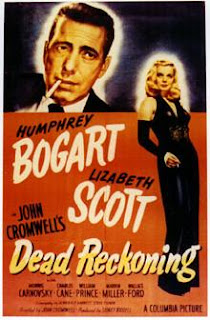Dead Reckoning
Dead Reckoning reminded me of the line in This Is Spinal Tap when Nigel Hufnel refers to an amp that can be set to eleven. Dead Reckoning is a film noir that is set to eleven. In some ways, it is close to parody, but in 1947, when this film was released, there was no such thing as noir--these types of films were called melodramas. But you'll recognize a lot of noir tropes here, some of them way over the top.
The film stars Humphrey Bogart as a paratrooper who has just returned from the war. Much of the film is told in flashback, as Bogart is hiding from the law in a church and tells his story to a priest. It seems that he and his buddy were on a train to Washington to receive medals, but when the buddy realizes he's going to have his picture taken, he bolts. Bogart tracks him down to a sleepy city on the Gulf Coast, and finds that the friend faked his identity and was a fugitive in a murder case.
The friend turns up dead, and though Bogart's character is merely the owner of a fleet of taxi cabs, he investigates. He gets to know the wife of the man the friend was accused of killing, played by Lizabeth Scott. Of course Bogart will fall in love with her. There's also a mobbed up owner of a casino, and his sadistic henchman.
Much of the plot doesn't make sense--I'm still not sure who killed who and who was telling the truth, but it's fun. There's a lot of great noir patter, such as when Bogart narrates on visiting a nightclub: "It was like feeding time at the zoo. It takes money to start and a bicarbonate of soda to finish." He says to Scott, late in the film, when he can't trust her, "How do I know you won't shoot me if I leave the cap off a tube of toothpaste?"
At times Bogart seems like he's channeling other films he's been in. He drinks a mickey and passes out, just like The Maltese Falcon, and you can't see him standing next to a roulette wheel without thinking of Casablanca. Scott, who has a perfect face and voice for noir (she had a low-pitch growl) was unfortunately not a great actress. It isn't helped that the script treats women like pawns. The treatment of black people in the film is not terribly enlightened, either.
Dead Reckoning was directed by John Cromwell at a fever pitch. It isn't the best noir, by any means, but it goes a long way in defining what the genre is.
The film stars Humphrey Bogart as a paratrooper who has just returned from the war. Much of the film is told in flashback, as Bogart is hiding from the law in a church and tells his story to a priest. It seems that he and his buddy were on a train to Washington to receive medals, but when the buddy realizes he's going to have his picture taken, he bolts. Bogart tracks him down to a sleepy city on the Gulf Coast, and finds that the friend faked his identity and was a fugitive in a murder case.
The friend turns up dead, and though Bogart's character is merely the owner of a fleet of taxi cabs, he investigates. He gets to know the wife of the man the friend was accused of killing, played by Lizabeth Scott. Of course Bogart will fall in love with her. There's also a mobbed up owner of a casino, and his sadistic henchman.
Much of the plot doesn't make sense--I'm still not sure who killed who and who was telling the truth, but it's fun. There's a lot of great noir patter, such as when Bogart narrates on visiting a nightclub: "It was like feeding time at the zoo. It takes money to start and a bicarbonate of soda to finish." He says to Scott, late in the film, when he can't trust her, "How do I know you won't shoot me if I leave the cap off a tube of toothpaste?"
At times Bogart seems like he's channeling other films he's been in. He drinks a mickey and passes out, just like The Maltese Falcon, and you can't see him standing next to a roulette wheel without thinking of Casablanca. Scott, who has a perfect face and voice for noir (she had a low-pitch growl) was unfortunately not a great actress. It isn't helped that the script treats women like pawns. The treatment of black people in the film is not terribly enlightened, either.
Dead Reckoning was directed by John Cromwell at a fever pitch. It isn't the best noir, by any means, but it goes a long way in defining what the genre is.



Comments
Post a Comment